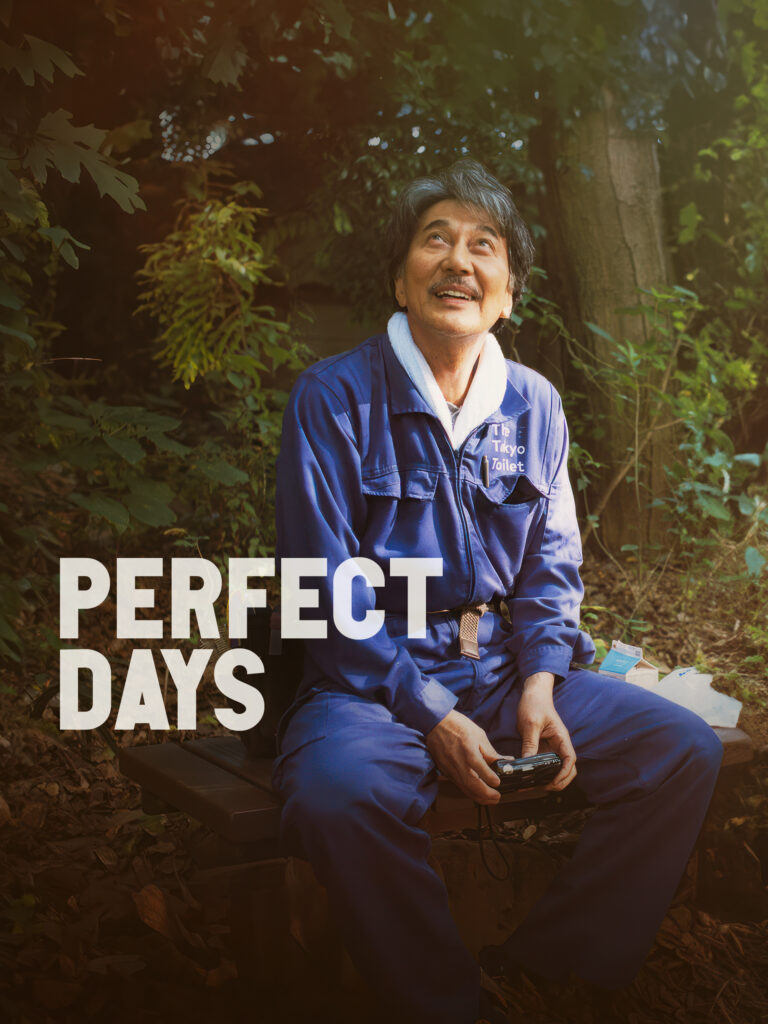Perfect Days – Snapshot
Perfect Days takes its name from a song by Lou Reed (Velvet Underground) which does feature in the movie. Like the song, this is a simple movie, with simple pleasures. It will appeal to those of us of a certain age who pine for the easier, less complicated times and marvel in the way light filters through the shimmering tree tops (komorebi). (4*)
Where to Watch:
Stream: Hulu
Rent/Buy: Prime/Apple/YouTube/Fandango/Google ($4)
Perfect Days – The Oscar Buzz
Oscar Nominations (1) / Oscar Wins (0) :
International Feature (Japan)
Perfect Days is this year’s International Feature film from Japan. And it is certainly filmed in Tokyo, the characters are all Japanese, and they all speak Japanese (when they speak!). But what makes this an even more interesting film is that the director, cinematographer, editor, and many other senior technicians are all German. The filmmaking world is getting more and more international.
There is also an intriguing story behind this movie’s origins. Our protagonist in this film, Hirayama is an employee of The Tokyo Toilet and his job is to clean them! But the toilets he cleans are not exactly typical public toilets. In fact, they are works of architectural art designed and constructed to showcase public support during the 2020 Tokyo Summer Olympics. Those games, or at least public attendance, was severely hampered by pandemic restrictions. The company who built them really didn’t want their designs – and they are marvelous – to go unnoticed, so they proposed the idea of a documentary to show the world what they had done, since they didn’t have much exposure as originally intended.
They latched on to the German filmmaker Wim Wenders who has done several feature films, but has helmed three documentaries that have been Oscar nominated (Pina, The Salt of the Earth, and Buena Vista Social Club). When Wenders saw what he was working with, he was inspired not to do a documentary, but rather a feature film that would feature nine of these spectacular creations. The result is Perfect Days. Wenders teamed with Takuma Takasaki to write the screenplay (and they did it in about 3 weeks), but, as you will see in the movie, there is very little dialogue. (I am unfamiliar with any of Takasaki’s or Wender’s other films). He also used Japanese production, costume, and makeup designers to ensure an authentic Tokyo feel to the characters and settings. For many of the technical crew positions, like cinematography, film editing, and sound, Wenders used German compatriots. (Sound Editor Frank Kruse was Oscar-nominated for Sound for All Quiet on the Western Front). In a rather remarkable feat, the entire film was shot in about 17 days.
Like most documentaries, there is no soundtrack and, in fact, no composed music for this film. Importantly, the auditory experience for Perfect Days is limited to the simple sounds that the characters make, a very small amount of dialogue, and the music that Hirayama plays when he punches one of his tapes into his older, small van’s tape player. The movie takes its name from a song, Perfect Day, by Lou Reed, principal of The Velvet Underground. The lyrics of the song describe well what Hirayama is looking for in his life.
The cast for Perfect Days is very small. Essentially, there is just one main character, Hirayama, played by Koji Hakusho, who does not have any Oscar history but did act in Babel (06). Two much younger characters, Takashi and Niko, both play important roles in developing Hirayama’s story, but they aren’t major characters in themselves. This is, ultimately, a very simple story about two weeks in the life of an enigmatic Japanese man.
Perfect Days – Related Movies
Pina (Direction, Screenplay, Editing)
The Salt of the Earth / Buena Vista Social Club (Direction, Screenplay)
Submergence (Direction, Editing)
Paris, Texas/ Wings of Desire/ Until the End of the World (Direction)
All Quiet on the Western Front (Sound)
Perfect Days – What Others Think
Audiences loved Perfect Days, rating it at the top of the list of all five International Feature nominees and in the top third of all 38 nominated movies, tied with Anatomy of a Fall and the documentary To Kill a Tiger. One of the viewer comments call it “a poetic ode to simplicity and serenity”. Another suggested it makes a distinction between “Alone vs lonely vs awakened.” And a third viewer suggested “this movie will hit you in a few days.” Most people who watch this movie don’t really know what they are getting into when they start it and are then pleasantly surprised with the emotional results.
As with last week’s movie, Society of the Snow, critics seemed to be much more, well, “critical”. While not ranking it quite as low as with that film, Perfect Days still came in next to the bottom among the International Feature films, and just below the middle of the pack of all 38 nominated movies. Ben Kenigsberg (RogerEbert) wrote “While black-and-white dream sequences add an element of mystery, Perfect Days finally feels a little slight.” And, if you want a movie to look and feel like a Marvel blockbuster, he is exactly right – this movie is in its essence, simplicity.
Some critics get that. Glenn Kenny (also RogerEbert) notes “There are a few critics I’ve seen who can’t abide the concomitant attitude of Hirayama and the movie itself.” He goes on to raise a very important point which is that the age of the viewer or critic may be very key to how they view this film. He writes “It is not a young man’s movie; it has the wisdom and poetic perceptions of an artist knowingly nearing the end of his life and career.” Alissa Wilkinson (New York Times) gave the film a Critics Pick and noted that Hirayama says little “instead he is an observer, attending to Tokyo and to the people in it with a tenderness and forbearance that, if you’re not paying attention, you’ll ascribe to a simple nature.” She also notes something the film makes very explicit which is the reliance on analogue recording methods, like 35 mm film and cassette tapes, and an implicit rejection of digital culture. (The film itself is in an older, 4:3 aspect ratio.) It should be noted that the film’s creator, Wim Wenders, was born in 1945 making him six years older than I am (and that’s old enough!). I will return to this notion in the final section, but I think part of the critical rejection of this movie is because most contemporary critics are younger folks for whom some of the messages of this film are not yet resonating.
The overwhelmingly positive audience rating for Perfect Days propelled this film to the top of the International Feature list and in the top third of all 38 nominated movies in our combined ratings, tied with American FictionandKillers of the Flower Moon.
Perfect Days – Special Mention
Komorebi – Since I don’t speak Japanese, I’m not sure that this word appears in the script for the film and, since there is no direct English translation, you won’t see it in the subtitles either. But komorebi plays an important part in this film. It means something like the way sunlight filters through tree leaves and reflects on the notion that, even though we see the phenomena virtually everyday, it is never exactly the same.
Hirayama starts every day emerging from his apartment and looking up at the sunlight flashing through the trees around his apartment. He eats lunch at the same park everyday admiring, and taking pictures of the canopy as the sun plays with the swaying branches. He takes simple but great pleasure out of komorebi. It means something very important in his understanding of his life.
Perfect Days – Michael’s Moments
Perfect Days is one of those films where the normal descriptive terms and genre definitions just don’t apply. There is just one important character, Hirayama, and the film covers in very precise detail his daily routine. We watch with almost a documentarian’s interest in how he wakens, his morning ablutions, his ride to work. We even see the precise way he goes about his duties of cleaning toilets. The story repeats daily with very little difference in details for about a week.
Things change in the second week and we learn a bit more about his life. He has a sister and a niece and, apparently, he once led a very different life. Something happened, and we are never told what his back story was, but neither do we need to know that. The focus is not on who he was, but who he is now.
The director, Wim Wenders, isn’t a young man and neither is his character, Hirayama. Because of that, there is an implicit rejection of much of contemporary culture – he doesn’t even know what Spotify is. Instead there is an explicit embrace of older things, like 35mm film, cassette tapes, and a catalog of music from decades ago, when Hirayama was a much younger man. I suspect that younger people may find Perfect Days a a bit anachronistic, simple, and even slow. But in so many ways, that is exactly what this film wants you to consider, and what makes it effective. Slow down for a minute and marvel in the simple things in life.
Perfect Days is not an action movie, rather it revels in the beauty of routine. It isn’t a romance or a love story, except in how it explores one man’s love of his own quotidian life. It isn’t a fantasy, but rather shows the beauty and fascination of the mundane. There isn’t really anything funny about cleaning toilets, and yet he smiles and it makes you smile. It doesn’t fit any standard genre definition but, in its grace and elegance, embraces them all.
Hirayama says very little – in fact, the dialogue for this two hour Perfect Days probably fits on just a few pages. But when he does speak it is with intention and purpose. At one point he instructs his teenage niece, whom he hasn’t seen since she was a toddler, “Next time is Next time. Now is Now.” It is exactly that message that he finds in komorebi. Enjoy the sunlight through the trees now because it won’t be the same next time you see it. If you can take two hours to leave the hectic pace of the modern world, and everything that comes with it, then you will enjoy this movie. Take the time to watch this film and enjoy the komorebi! (4*)


